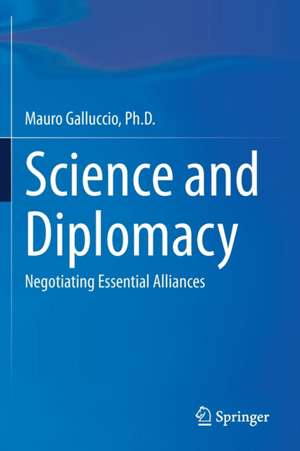Science and Diplomacy: Negotiating Essential Alliances
Autor Mauro Galluccio, Ph.D.en Limba Engleză Paperback – 7 ian 2022
| Toate formatele și edițiile | Preț | Express |
|---|---|---|
| Paperback (1) | 724.00 lei 6-8 săpt. | |
| Springer International Publishing – 7 ian 2022 | 724.00 lei 6-8 săpt. | |
| Hardback (1) | 730.02 lei 6-8 săpt. | |
| Springer International Publishing – 7 ian 2021 | 730.02 lei 6-8 săpt. |
Preț: 724.00 lei
Preț vechi: 882.92 lei
-18% Nou
Puncte Express: 1086
Preț estimativ în valută:
138.55€ • 143.83$ • 115.53£
138.55€ • 143.83$ • 115.53£
Carte tipărită la comandă
Livrare economică 24 martie-07 aprilie
Preluare comenzi: 021 569.72.76
Specificații
ISBN-13: 9783030604165
ISBN-10: 3030604160
Ilustrații: XXVII, 211 p. 12 illus., 6 illus. in color.
Dimensiuni: 155 x 235 mm
Greutate: 0.34 kg
Ediția:1st ed. 2021
Editura: Springer International Publishing
Colecția Springer
Locul publicării:Cham, Switzerland
ISBN-10: 3030604160
Ilustrații: XXVII, 211 p. 12 illus., 6 illus. in color.
Dimensiuni: 155 x 235 mm
Greutate: 0.34 kg
Ediția:1st ed. 2021
Editura: Springer International Publishing
Colecția Springer
Locul publicării:Cham, Switzerland
Cuprins
Part I: Perception and misperception in science diplomacy.- Introduction - Book organisation.- Adaptive decision-making process in crisis situations.- Part II: Science and Diplomacy: Negotiating a Joint Engagement.- Science Diplomacy.- Science Diplomacy and the EU.- Evidence-Informed Policymaking.- Climate Change and Extreme Hazards.- Evidence-informed policymaking: The Way Forward.- Part III: Biosecurity and Environmental Disaster: Adaptive decision-making in time of uncertainty.- A major challenge to the uncertainty of modern times.- Crisis Management and Risk Assessment in the EU: A General Outline.- International Cooperation.- Part IV: Theory, research, and practice for Science diplomacy: An insight on cooperative processes.- International Alliance for Science Diplomacy. Interpersonal skills as a predictor of a sound negotiation process: American and European self-perception.- Evidence-Informed Policymaking: A European Multi-Actor Innovative Project.- Misunderstanding the first Nuclear crisis with North Korea: The inconvenient science in negotiations.- Scientists meet diplomats: A cognitive insight on interpersonal negotiation process.
Notă biografică
Mauro Galluccio Ph.D. is a political scientist, psychologist, and cognitive behavioural therapist in clinical practice. He completed his Post-doctoral Fellowship at the Johns Hopkins University, where he was also a Visiting Scholar for two full years, at SAIS (School of Advanced International Studies) in Washington D.C. Dr Galluccio is the president of EANAM (European Association for Negotiation and Mediation) based in Brussels. He is advisor to the Joint Research Center (JRC) on evidence-informed for policymaking and seasoned expert evaluator, ethics expert and peer reviewer to the ERC (European research Council) and REA (Research Executive Agency) for founding projects and programs of the European Union. Dr Galluccio has worked for many years within the European Institutions as political analyst and adviser. He has been a public external speaker and professorial lecturer for more than 20 years to the European Commission of the EU (DG COMM - EC Presidency), in charge of the EU Institutions and policymaking. He has been adviser to the UNDP (United Nations Development Program) on mentoring programme for trainers. He is the editor and author of the Handbook of International Negotiation: Interpersonal, Intercultural, and Diplomatic Perspectives, 2015, Springer, New York. He is co-author of Psychological processes in international negotiations: theoretical and practical perspectives (with F. Aquilar, Springer, New York, 2008) and co-editor of Psychological and Political Strategies for Peace Negotiation. A Cognitive Approach (with F. Aquilar, Springer, New York, 2011).
Textul de pe ultima copertă
This book lays the groundwork for a new field of study and research in the intersection between science and diplomacy. It will review the multi-disciplinary research in this burgeoning area in providing the scientific foundation for the application of psychological principles to understanding and facilitating political decisions in an international context. Focusing on how people think, act, and feel on both individual and collective levels, this book takes into account a realistic perspective from which transformative processes can emerge. It follows the ongoing debate in the EU and the world in providing a better understanding of the tools that can be deployed to improve communication and cooperation between scientists, politicians, and diplomats in this field. The failure of communication in this COVID-19 planetary crisis has not been about whether or not objectives have been achieved, but about the ability of major actors to cooperate to forge links with people. The way policymakers and scientists will manage their interpersonal negotiations will be of great importance in fostering international cooperation and coordinated problem-solving behaviours. Otherwise, science diplomacy will lose sight of its most important purpose: that of helping to solve problems, conflicts, and diplomatic processes for the sake of humanity.
Caracteristici
The Author is a political scientist, psychologist and CBT psychotherapist operating in a globally influential setting Defines the issues that bring successful conflict resolution Describes tools for more efficient and effective negotiations Uses an evidenced-informed policymaking approach Includes discussion of cognitive psychology, clinical and affective neuroscience issues Addresses barriers to communication between scientists and diplomats
